Related Research Articles

The Byrds were an American rock band formed in Los Angeles, California, in 1964. The band underwent multiple lineup changes throughout its existence, with frontman Roger McGuinn remaining the sole consistent member. Although their time as one of the most popular groups in the world only lasted for a short period in the mid-1960s, the Byrds are today considered by critics to be among the most influential rock acts of their era. Their signature blend of clear harmony singing and McGuinn's jangly 12-string Rickenbacker guitar was "absorbed into the vocabulary of rock" and has continued to be influential.
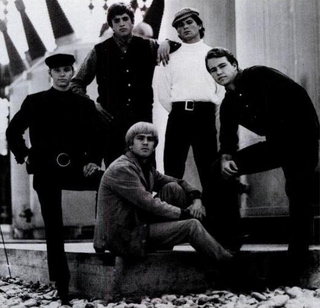
The Electric Prunes are an American psychedelic rock band, formed in Los Angeles, California, in 1965. Much of the band's music was, as music historian Richie Unterberger described it, possessed of "an eerie and sometimes anguished ambiance." Their most successful material was by songwriters Annette Tucker and Nancie Mantz, though the group also penned their own songs. Incorporating psychedelia and elements of embryonic electronic rock, the band's sound was marked by innovative recording techniques with fuzz-toned guitars and oscillating sound effects. In addition, guitarist Ken Williams' and singer James Lowe's concept of "free-form garage music" provided the band with a richer sonic palette and exploratory lyrical structure than many of their contemporaries.
Folk rock is a genre of rock music with heavy influences from English folk and American folk music. Combining the elements of folk and rock music, it arose in the United States, Canada, and the United Kingdom in the mid-1960s. In the U.S., folk rock emerged from the folk music revival. Performers such as Bob Dylan and the Byrds—several of whose members had earlier played in folk ensembles—attempted to blend the sounds of rock with their pre-existing folk repertoire, adopting the use of electric instrumentation and drums in a way previously discouraged in the U.S. folk community. The term "folk rock" was initially used in the U.S. music press in June 1965 to describe the Byrds' music.
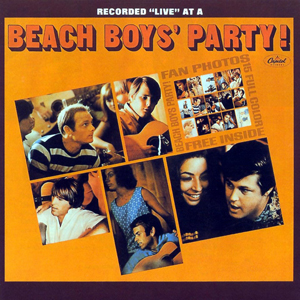
Beach Boys' Party! is the tenth studio album by American rock band the Beach Boys, and their third in 1965, consisting mostly of cover songs played with acoustic instruments. It reached No. 6 in the US and No. 3 in the UK. The album spawned one single, a cover of the Regents' "Barbara Ann", which reached No. 2 in the US and No. 3 in the UK, and was their highest-charting British single to that point.

The Music Machine was an American rock band formed in Los Angeles, California in 1966. Fronted by chief songwriter and lead vocalist Sean Bonniwell, the band cultivated a characteristically dark and rebellious image reflected in an untamed musical approach. Sometimes it made use of distorted guitar lines and hallucinogenic organ parts, punctuated by Bonniwell's distinctively throaty vocals. Although they managed to attain national chart success only briefly with two singles, the Music Machine is today considered by many critics to be one of the groundbreaking acts of the 1960s. Their style is now recognized as a pioneering force in proto-punk; yet within a relatively short period of time, they began to employ more complex lyrical and instrumental arrangements that went beyond the typical garage band format.

Thomas Harvey "Sean" Bonniwell was an American singer-songwriter/guitarist, who was known as the creative force behind the 1960s garage rock band, The Music Machine.
Psychedelic folk is a loosely defined form of psychedelia that originated in the 1960s. It retains the largely acoustic instrumentation of folk, but adds musical elements common to psychedelic music.

Aynsley Thomas Dunbar is an English drummer. He has worked with John Mayall, Frank Zappa, Jeff Beck, Journey, Jefferson Starship, Nils Lofgren, Eric Burdon, Shuggie Otis, Ian Hunter, Lou Reed, David Bowie, Mick Ronson, Whitesnake, Pat Travers, Sammy Hagar, Michael Schenker, UFO, Michael Chapman, Jake E. Lee, Leslie West, Kathi McDonald, Keith Emerson, Mike Onesko, Herbie Mann and Flo & Eddie. Dunbar was inducted into the Rock and Roll Hall of Fame as a member of Journey in 2017.

The Marshall Tucker Band is an American rock band from Spartanburg, South Carolina. Noted for incorporating blues, country, and jazz into an eclectic sound, the Marshall Tucker Band helped establish the Southern rock genre in the early 1970s. While the band had reached the height of its commercial success by the end of the decade, it has recorded and performed continuously under various line-ups for 50 years. Lead vocalist Doug Gray remains the only original member still active with the band.
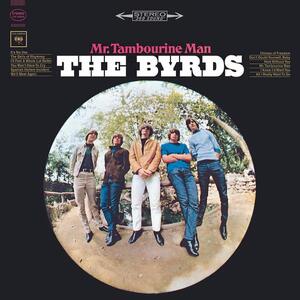
Mr. Tambourine Man is the debut studio album by the American rock band the Byrds and was released on June 21, 1965, by Columbia Records. The album is characterized by the Byrds' signature sound of Jim McGuinn's 12-string Rickenbacker guitar and the band's complex harmony singing. The material on the album mostly consists of cover versions of folk songs, primarily composed by Bob Dylan, and originals written or co-written by singer Gene Clark. Along with the Dylan-penned single of the same name, Mr. Tambourine Man established the band as an internationally successful act and is widely regarded by critics as representing the first effective American challenge to the chart dominance of the Beatles and other British Invasion bands during the mid-1960s.
Terry Knight and the Pack was an American garage rock band formed in Flint, Michigan in 1965. The band was signed to the Lucky Eleven label through most of its brief recording career. They produced one national hit with their cover version of the song, "I ". Despite their inability to replicate their success, the band was a frequent attraction in the Michigan rock scene. The Pack was fronted by singer Terry Knight. In 1969 the group disbanded but two members, drummer/vocalist Don Brewer and guitarist Mark Farner, would go on to form another band, Grand Funk Railroad.

Christopher Walenty Dreja is an English musician, best known as the rhythm guitarist and bassist for rock band the Yardbirds for which he was inducted into the Rock and Roll Hall of Fame in 1992.

"Heart Full of Soul" is a song recorded by English rock group the Yardbirds in 1965. Written by Graham Gouldman, it was the Yardbirds' first single after Jeff Beck replaced Eric Clapton as lead guitarist. Released only three months after "For Your Love", "Heart Full of Soul" reached the Top 10 on the singles charts in the UK, US, and several other countries.

Focus Plays Focus is the first studio album by Dutch rock band Focus, released in September 1970 on Imperial Records. It is the only album recorded by the group's original line-up consisting of organist and vocalist Thijs van Leer, bassist Martin Dresden, drummer Hans Cleuver, and guitarist Jan Akkerman. It was renamed In and Out of Focus for the international re-release of the album from 1971 onwards which included their debut single "House of the King".

"Who Do You Love?" is a song written by American rock and roll pioneer Bo Diddley. Recorded in 1956, it is one of his most popular and enduring works. The song represents one of Bo Diddley's strongest lyrical efforts and uses a combination of hoodoo-type imagery and boasting. It is an upbeat rocker, but the original did not use the signature Bo Diddley beat rhythm.
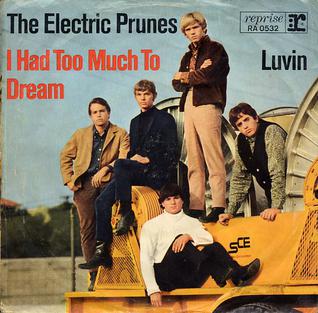
"I Had Too Much to Dream (Last Night)" is a song written with music by Annette Tucker and lyrics by Nancie Mantz, which was recorded in late 1966 by the garage rock band The Electric Prunes. Released as the band's second single, it reached number 49 in the UK and peaked at number 11 on the Billboard Hot 100 the week ending February 11, 1967.

Triangle is the fourth studio album by American rock band the Beau Brummels. Produced by Lenny Waronker and released in July 1967, it was the band's first album to include songs that vocalist Sal Valentino and guitarist Ron Elliott composed together. The band incorporated fantasy elements and surreal characters into the album's song titles and lyrics, and worked with a variety of session musicians to create Triangle's psychedelic musical style. The Beau Brummels were reduced to a trio—Valentino, Elliott, and Ron Meagher—at the time Triangle was recorded, as former group members Don Irving (guitars) and John Petersen (drums) left the band following the release of the group's previous album, Beau Brummels '66.
"Cod'ine" is a contemporary folk song by singer-songwriter Buffy Sainte-Marie. Considered one of the earliest anti-drug songs, Sainte-Marie wrote the piece after becoming addicted to codeine which she had been given for a bronchial infection. She recorded it for her debut album, It's My Way! (1964).

Close is a solo album by American rock musician Sean Bonniwell, credited under the moniker T. S. Bonniwell, who had been the creative force behind the innovative garage rock band The Music Machine. The album was released on August 4, 1969, by Capitol Records. It marked a total departure from Bonniwell's rebellious protopunk period with The Music Machine, to a soft rock crooning style. In addition, the album blended folk rock and orchestrated influences, and was inspired by Bonniwell's stints in the pre-Music Machine groups, the Wayfarers and the Ragamuffins, along with his desire to be more poetically inclined. The song,"Where Am I to Go", was released as a single ahead of the album, but failed to chart. Like its attendant single, Close was also somewhat commercially unsuccessful, and was the last recording by Bonniwell for the next 20 years.
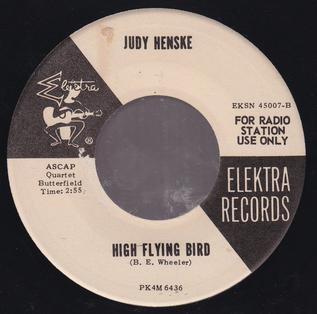
"High Flying Bird" is a song written by American folk and country singer-songwriter Billy Edd Wheeler, and first recorded by Judy Henske in 1963. It was performed and recorded by many musicians and groups in the mid and late 1960s, and was influential on the folk rock genre.
References
- ↑ "The 50 albums that shaped Vancouver". Georgia Straight, May 3, 2017. by John Lucas, Adrian Mack, Steve Newton, Mike Usinger, Alexander Varty.
- 1 2 3 Mother Tucker's Yellow Duck, The Canadian Pop Music Encyclopedia. Retrieved 6 July 2020
- 1 2 3 Mother Tuckers Yellow Duck, CanadianBands.com. Retrieved 6 July 2020
- ↑ "Mother Tucker's Yellow Duck", Broadcaster, April 1970, p.13
- ↑ Richie Unterberger, Band biography, Allmusic.com. Retrieved 6 July 2020
- ↑ "60s Can. Rock", Back to the Sugar Camp, 17 February 2014. Retrieved 6 July 2020
- ↑ Review, Home Grown Stuff, TheRisingStorm.net. Retrieved 6 July 2020